Weekly Writing Summary For The Week Ending 5/30/2024
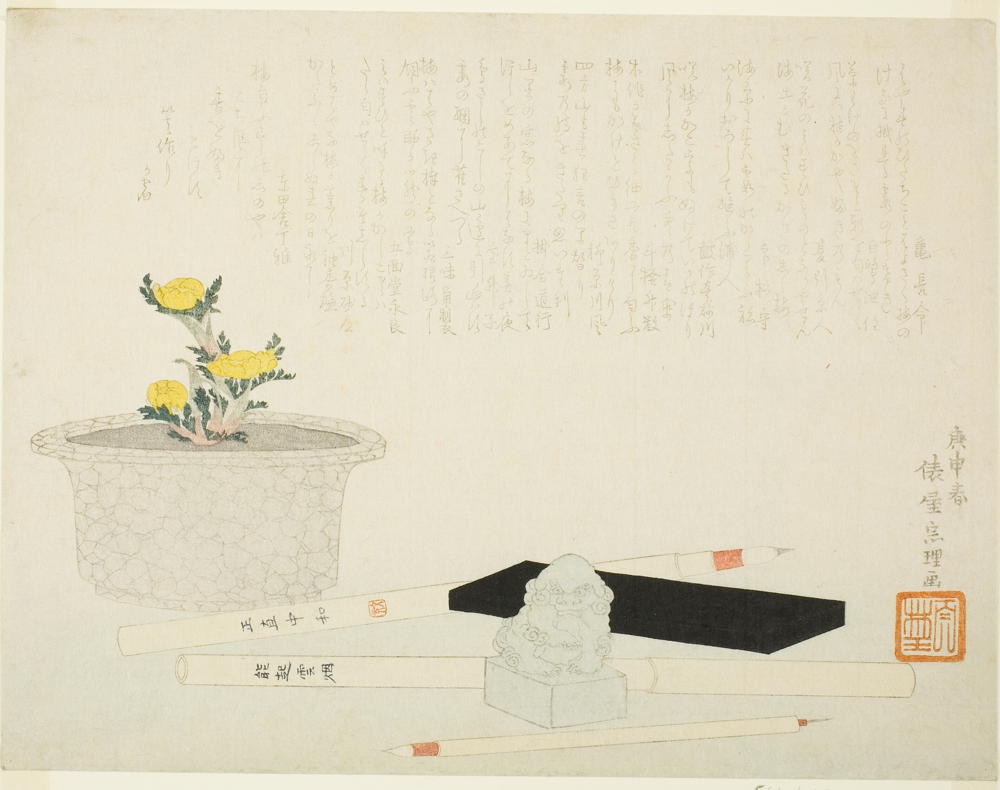
Hishikawa Sori III:
Potted adonis with writing implements (1800)
Delving Into History Insists
Delving into history seems like an inherently dangerous activity. While nobody can ever honestly foresee their future, the same holds for foreseeing their history, for it couldn't have possibly been as expected. The very nature of forebears seems mysterious, just like nobody ever understands the underlying nature of their parents' relationship’s covenant. It's not exactly a secret but of another context, not for anybody but the principles to ever profoundly comprehend. No amount of study will ever unwrap the underlying mystery, though even superficial study seems likely to uncover previously unrecognized elements. The same holds for distant ancestors as it must for immediate family. Dealing with more distant relatives erases the more closely shared context immediate relatives share. I have no possibility of anticipating the lives of relatives who spoke now derelict languages in places impossibly different than any surviving place in this world. Their motives must leave me clueless. Their morals simply must seem questionable. Delving into history insists upon me exercising my most generous possible interpretations.
Colonization
King Henry VII of England-
Lord Howth was his cousin by marriage,
and a reliable supporter of his Tudor dynasty
"We seem too stupid to survive."
I fear this story will contain little but venom, for I'm finally understanding the meaning of British aristocracy. It was traditionally a means for legally stealing property under various Might Makes Right Statues going back into antiquity. If people had been respectful and decent, they would have had no good reason ever to violate their neighbor's sovereignty with bogus claims of superiority. I'm afraid it became a habit inherited from antiquity. Those who didn't commit atrocities justified by some deity seemed to have been the rare exceptions. They produced little history due to the traditional difficulty of producing an acceptable story once your head's been separated from your body. Service in the Roman Army seems little different than service in the British or the French or the Spanish; it was all slash and burn, kill and eventually be killed, futility elevated to lifestyle. A few enjoyed great wealth, but only when it was possible to enjoy a celebration atop a mountain of moldering bodies.
Norman/British lords invaded Ireland in the late twelfth century under the justification that controlling the Eastern edge of Ireland would make it more difficult for a hostile power to launch an invasion from there.
KatherineSwynford
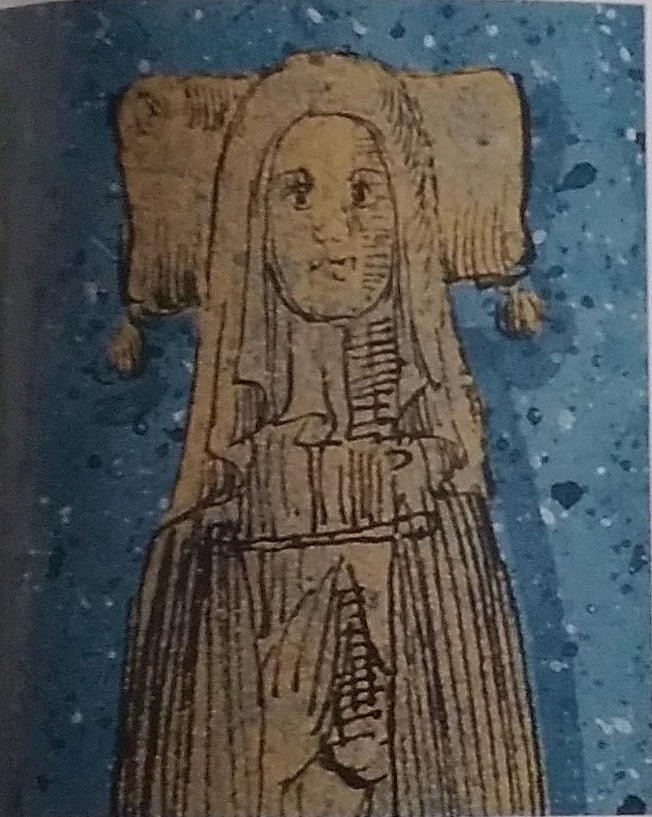
Unknown Artist: Katherine Swynford,
from her tomb, Lincoln Cathedral (1403)
"Swynford was an exceptional presence."
My eighteenth great-grandmother was born Katherine de Roet in 1349, in Hainaut, a territorial lordship straddling the current border of France and Belgium, the daughter of a knight. She came to England as a child when her father accompanied Phillippa, a daughter of William of Holland, when she married King Edward III. She was raised in the English royal household and reportedly started working there when she was ten, tending to the royal children. One of the king's sons, John of Gaunt, nine years Katherine's senior, knew her well. Katherine married Hugh Swynford, one of Gaunt's knights, at thirteen, a common enough age for noblewomen to marry then. Swynford owned a fiefdom but a poor one. Katherine dedicated herself to caring for the estate, Kettlethorpe, after Swynford died in Aquitaine in 1771 while on a military expedition with Gaunt, leaving her with four children.
Katherine was in and out of the King's and Gaunt's employ after that.
VisitingHistory
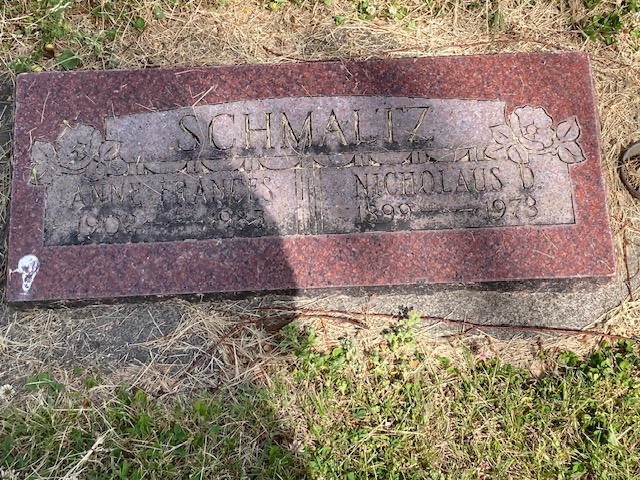
Gravestone of Nicholas Daniel Schmaltz,
my fraternal grandfather
" … grateful for the one day each year reserved for performing the obligatorily impossible …"
I didn't make the funeral. I was living in Seattle on an unheated sleeping porch with my to-be wife. Those days, I traveled by thumb, taking to an onramp or highway verge and sticking out my thumb. It took about half a day to travel back home that way and another half day to return. I begged off so I didn't see where they'd buried my grandpa Nick. We were not close. He and my father had a prickly history and a distant relationship, which rubbed off on the kids. When I was in high school, he and his second wife lived almost across the street from my best friend's house, but I rarely stopped by. Later, they relocated to be closer to her daughter’s family. Nick had been in failing health when he died, not unexpectedly, just a year older than I am today. He became history, but I was not there to witness his inauguration.
The Muse had been after me for years to drive up to visit his grave.
FakingHistory
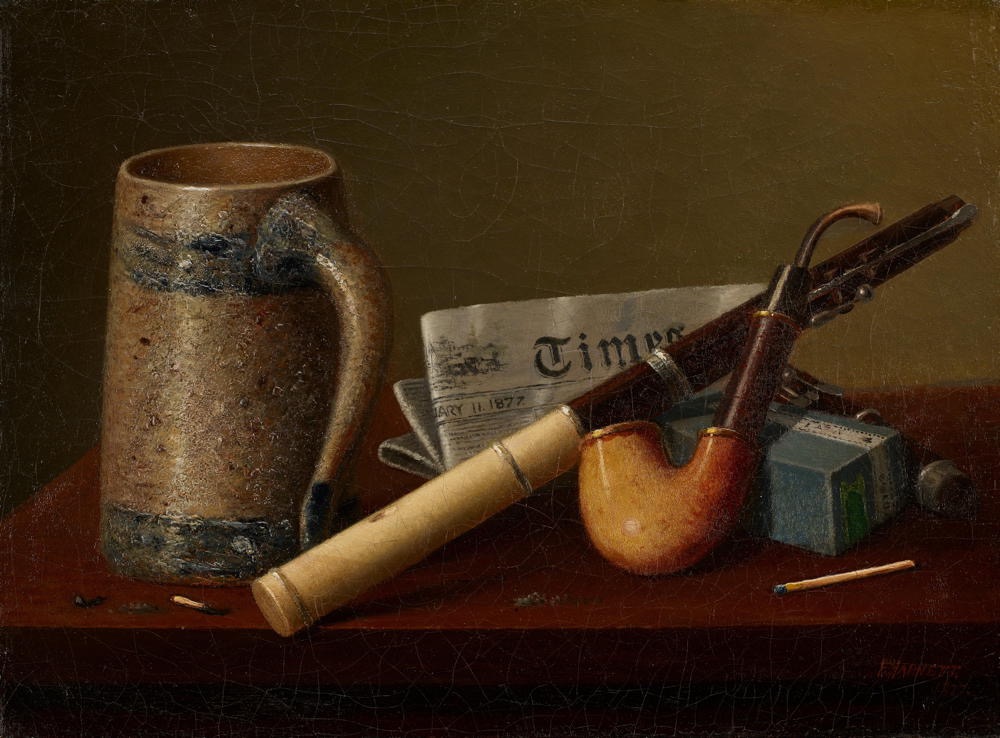
William Michael Harnett:
Still-life with Flute and Times (1877)
" … nobody has a better foundation than the notoriously unstable shifting sands of time."
Genealogy was never a precise practice. It always relied upon iterated approximations such that its research reliability inevitably degraded. Even the more recent entries can be subject to misinterpretation or faulty memory, and not even recent memory is likely to be all it was cracked up to be. Studies suggest that we interpret experiences even as they occur, replacing unfamiliar details with more readily recognizable ones. Most of this business can be the soul of innocence rather than malign intent or deliberate misrepresentation. Still, some of whatever's uncovered requires judgment to interpret, and humans have grown notorious for unconsciously laying their thumbs on scales. Given a choice between two interpretations, we're likely to select the one that preserves our narrative rather than one that contradicts it, even when we know that experience frequently contradicts precedent. We're usually more interested in maintaining coherence than disturbing it.
All this seems to be the very soul of innocence.
LivingHistory
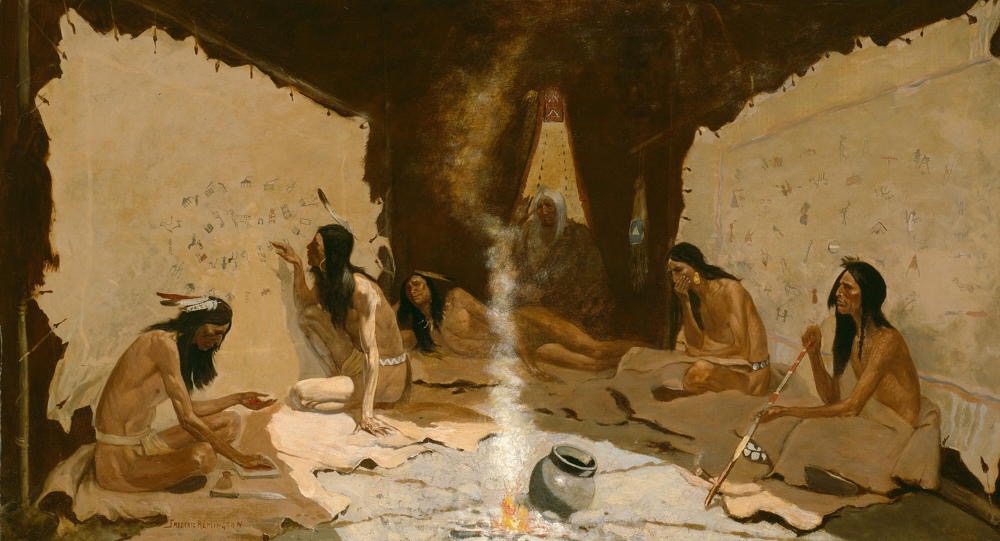
Frederic Remington: Historians of the Tribe (1890–99)
"Cicadas, like history, spend much more time in the ground than they ever spend making noise."
For most of my life, my history has lived in a series of loose-leaf binders, papers separated by surnames, compiled by my Aunt Colleen and her aunts and great-aunts. I occasionally visited these documents to refresh my memories before replacing them back in their basement banker's box repository. When I finally started trying to comprehend the stories, I quickly found nearly overwhelming additional evidence that considerably expanded what I'd always considered my history by centuries. Now, the volume of material should properly prove impossible to remember and also essentially impossible to chronicle. The material I've dredged up creating this series will never be subjected to my Aunt Colleen's scrutiny and organizing abilities since she has already been gone for more than thirty-five years: history.
I feel moved this morning to wonder just where my history resides.
Romance

Antonie Wierix (II), after Maerten de Vos:
Kerkvader Ambrosiusm [Churchfather Ambrosium] (1585)
" … even though my forebears just passed through."
When I entered first grade, I spoke as if I'd come from Missouri, close enough to Southern that I was immediately enrolled in a special speech class so I could learn to speak correctly. I had never lived in Missouri, though most of my Mother's forebears had at least passed through there on their way West. Several had initially considered Missouri their objective, but a short stay within that swampy, gray country convinced them that any place would be better than that fever-ridden territory, even Texas. Fortunately for me, they mostly eventually migrated on to Oregon, though they retained their twangs through the two or three subsequent generations. My grandfather, whose name was Elza, pronounced Elzie, spoke with a lightly amused drawl, mispronouncing many words to my ear. Those were the days before television, before the great homogenization of American English that came from tuning into Southern California every evening. Radio dramas still employed stereotyped ethnic dialects that would curdle my granddaughters' ears and even make me blush. Still, we were reared on Katzenjammer Kids German and Chef Boyardee Italian, whicha was good enougha fur me! I had been unaware that I had been pronouncing my words incorrectly.
I was exposed to properly rolled Rs and final syllables; neither had seemed necessary beforehand.
Weekly Writing Summary For The Week Ending 5/23/2024
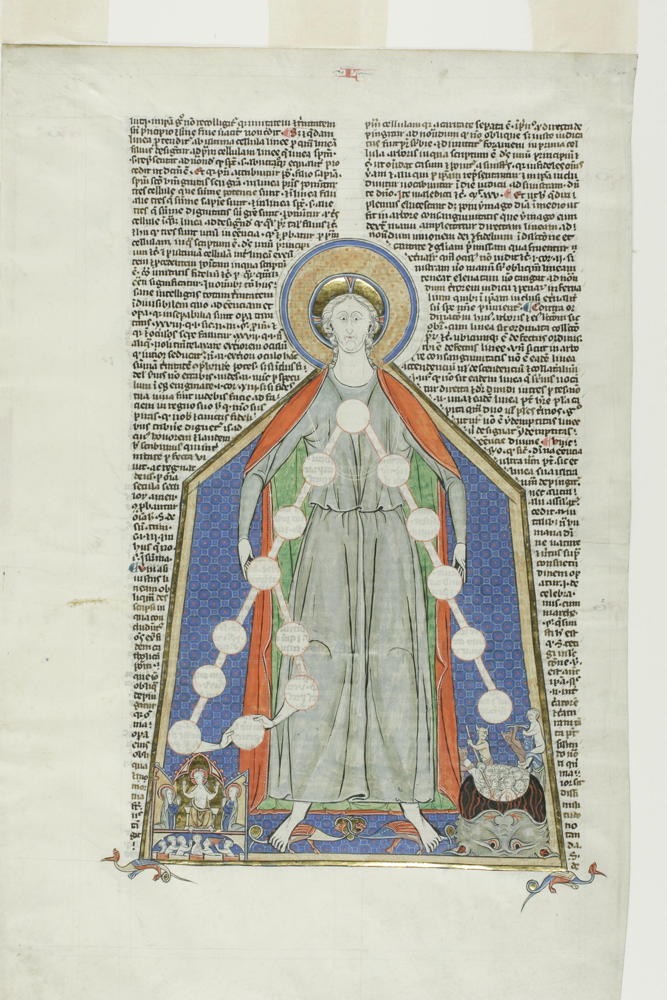
Text by Henri of Segusio, Artist unknown: Table of Bigamy,
from the Summa Super Titulis Decretalium Completa (1275-99)
The Only Other Option
I have become weary of my history. I've been too long at the fair. My investigation began as all investigations start, with that mixture of excitement and mystery and the promise of imminent discovery. The discoveries have come almost non-stop, but once I managed to bring together all the disparate threads to my birthplace, I lost impetus. I couldn't quite see the relevance of continuing further. I found some interesting sidelights and notable features here and there along the old timeline. Still, I felt like I had started gilding lilies and wondered how relevant my later discoveries could prove. Was I just muddying up my story with so many coda embellishments? Was I inadvertently producing a rococo history of a rather ordinary family? Very little of my history seems present in my generation. I cannot change anybody's past, though my Fambly's past might be in the process of changing me. I'm here on the pointy end of history where marriages, births, and deaths continue creating FreshHistory like volcanos create fresh territory. My past has inexorably changed me. I might just as well believe it has changed me for the better. The only other option would be worse, and there's no leverage in believing my future's worse than my past.
PowerfulWomen
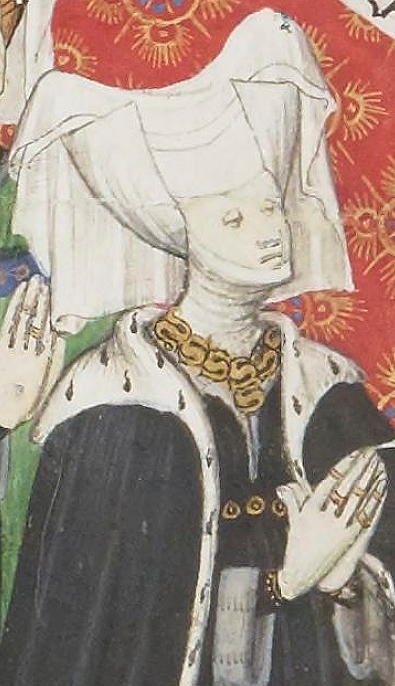
Meister der Münchner Legenda Aurea:
Joan Beaufort, Countess of Westmoreland as wife of Ralph Neville,
from an image in the Neville Book of Hours (1430-35)
" They created the new worlds their husbands just imagined."
No Fambly's genealogy could ever be understood without acknowledging the role PowerfulWomen played. The histories might be relatively thin on the details describing their influence, but they were just as crucial to creating history as the most noteworthy male. Charlemaigne's second wife (of four), Hildegarde de Vintzgau Herstal, was married at 12 or 13 and traveled with her husband on his military campaigns, dropping nine babies all along the way, including a set of twins and a future king of Italy. She thereby secured her husband's legacy. She died at 26 in childbirth. It's said that she was the grandmother of every subsequent king of England and France, not to mention that one of Italy.
Each generation featured equally PowerfulWomen.
ArcOfHistory
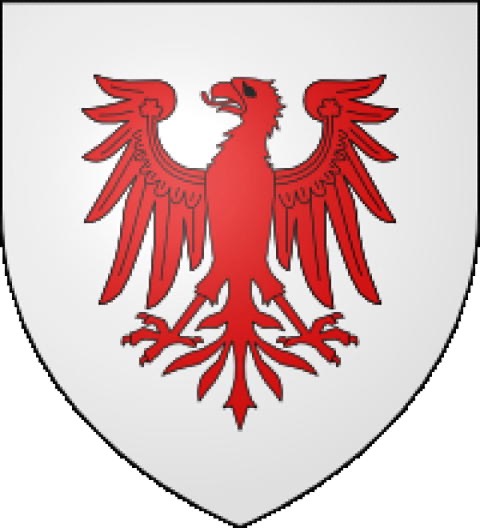
Shield of Ansbert Ansbertus Gallo De BRANDEBOURG,
supposedly my forty-fourth great-grandfather (circa 510)
If you struggle to follow my descriptions of my Fambly history, you're in decent company because I struggle, too. I cannot determine if the more ancient history amounts to truth or fantasy. Even the experts give mixed reviews. I have apparently been reporting the more popular history, the one that the experts find most suspicious. Early Frankish kings reportedly published lavish histories to legitimize their rule. Their ruse, if it was a ruse, largely succeeded in at least creating a ruling myth that convinced most that they were authentic, whether or not they were. I hold questions about how Romans managed to pivot into prominence within both the Carolingian and Merovingian dynasties, both precursors to more modern French and English rulers. The short answer should seem obvious enough. They succeeded by strategic marriages. Wed the daughter of a king, and you became the doted upon son-in-law, and certain avenues open that would have otherwise been closed. If my Fambly history was ever more than mythology, my forebears slept their way to the top, the most old-fashioned of the many old-fashioned ways.
And the top they did achieve.
Genetics

Pieter Serwouters:
An Allegory of Relations between the Generations (1608)
" … the historical record seems clear."
I imagine that one day, somebody will discover a way to reconstruct my Fambly's entire history by analyzing DNA. Then, the birth and death details and the Fambly Tree's intricate webs might become definite and unquestionable. Until then, though, reconstructing a Fambly's history remains relatively painstaking. Between transcription errors and superficial differences of opinion, any two researchers’ results might remain eternally unresolvable. After all, the original principles will never be here to settle any of the many inevitable differences. Who I am will remain a steadfastly subjective question with a slightly less than even any distantly objective response.
Still, science continues her inexorably stroll.
Cohorts
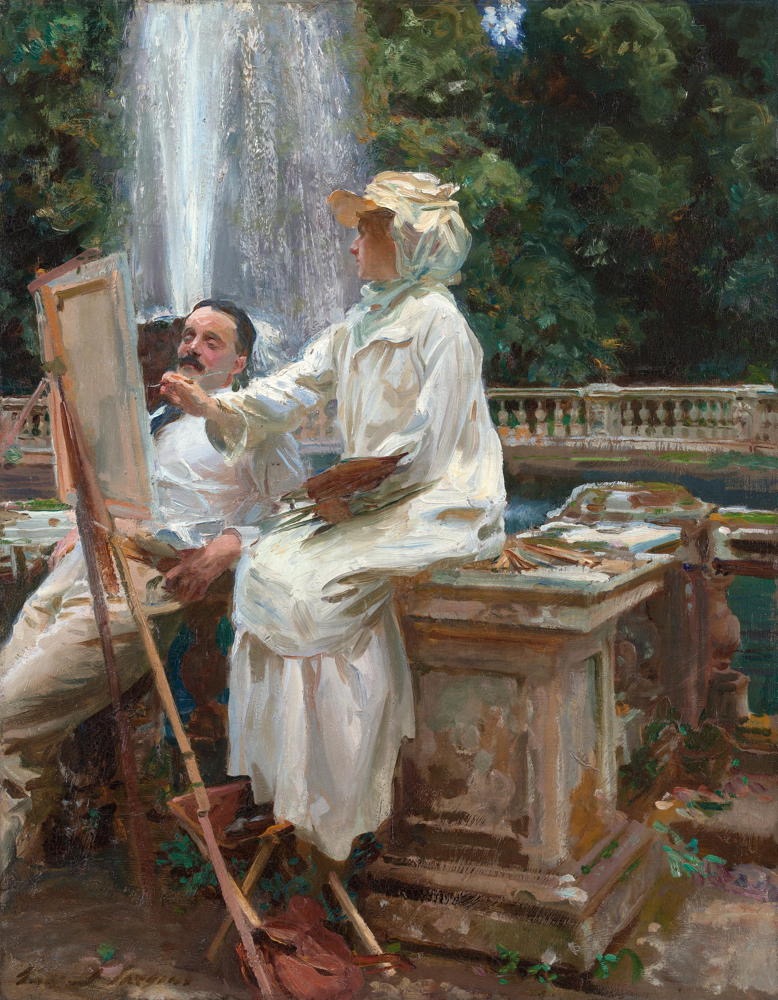
John Singer Sargent:
The Fountain, Villa Torlonia, Frascati, Italy (1907)
" … not merely as mythical rugged individuals."
The typical Fambly tree tells much less than half a Fambly's story, for family constitutes only part of anyone's usual Cohort. We're unavoidably rooted in Fambly, but most of us choose to stray from the founding fold into different country. We marry out of the Fambly, or most of my forebears did. We also often work far away, seeing even our closest blood relations perhaps only on holidays, a scant few days each year, if that. We usually most distantly relate with those to whom we're most closely related, once intimate but later almost strangers. We retain those traits and characteristics native to our Fambly. After all, we did learn the fundamentals together. We probably retain speech and behavior patterns we learned before we became aware of learning anything, our relations appearing in common quirks and similar phrasings.
We spend most of our time on this Earth with Cohorts: work buddies, acquaintances, friends, and neighbors.
DearlyDeparted
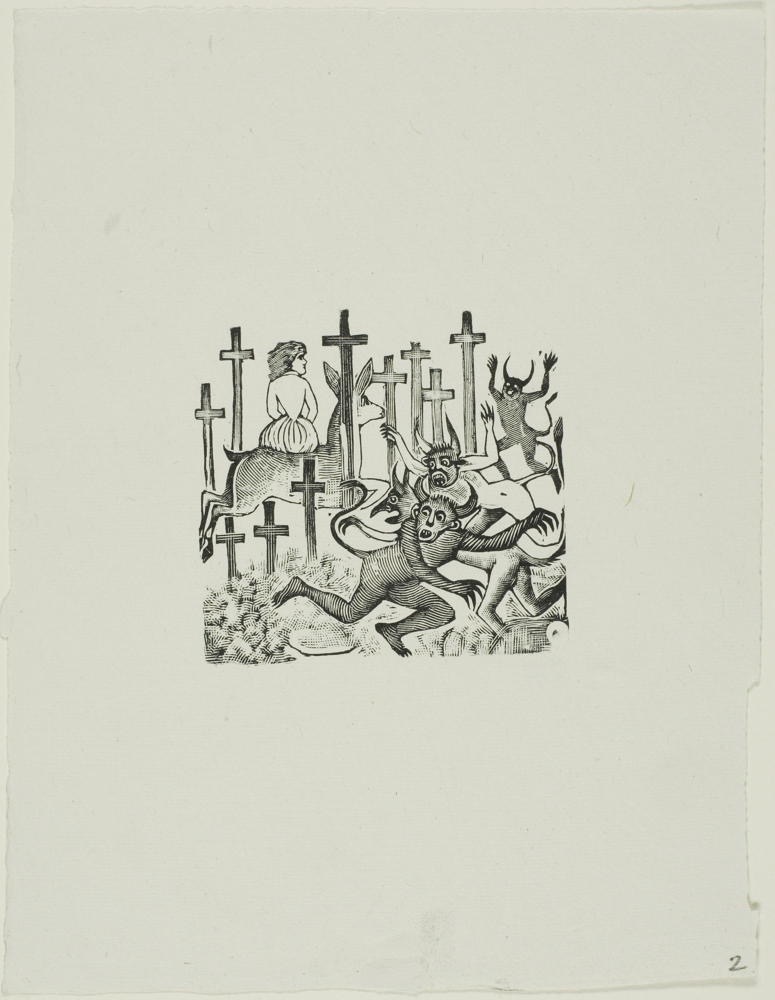
José Guadalupe Posada:
Devils in the Graveyard (n.d., circa 1871-1913)
" … not yet wholly history …"
I have visited few of my ancestor’s final resting places, though The Muse and I have tried to visit all we could over the years. We found traces of my earliest immigrant forebears in a well-weathered gravestone for my first Pilgrim great-grandmother preserved in a wall in Guilford, Connecticut. I found a fourth great-grandfather, Major George Currin's stone, in the town cemetery in Galax, Virginia, the one carved by his sons before they left for Oregon. I found Silvanus Seward, another fourth great-grandfather's stone, overgrown in an almost abandoned upstate New York cemetery. I never met any of these revered ancestors personally, though. In my life, I’ve met only the most recent tier of ancestors, most of them just before they became ancestors when they were still grand and great-grandparents, aunts, and uncles. I've even lived long enough now where I've known some contemporaries and their offspring who left before me, none of them ancients yet; I think of each of these as the DearlyDeparted.
Those who lived centuries ago might spark my imagination and even garner heartfelt admiration, but I never actually knew them, so my affection feels distant.
FreshHistory
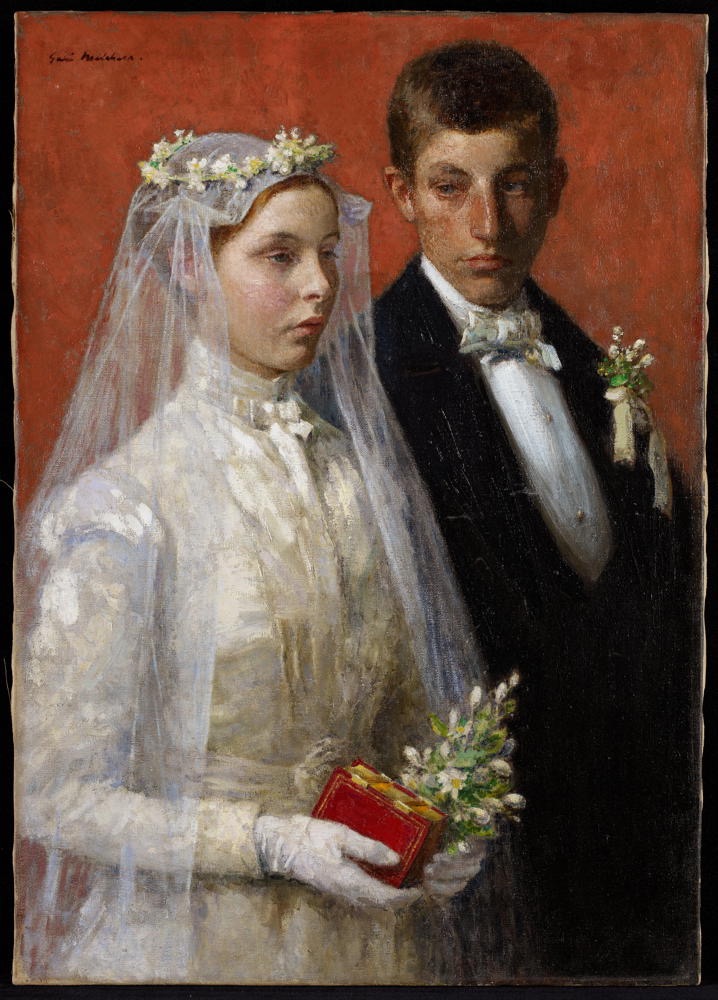
Gari Melchers: Marriage (1893)
" … we attemded a banquet."
Every present moment inexorably slips into some past, but not every past qualifies as history or aspires to. I might best describe much of everyday experience as maintenance, not in any way a similar substance to what might inexorably become history. Births, deaths, and marriages seem destined to become history, while the memory of Tuesday's supper doesn't seem likely to make it to the end of that week. Every moment might ultimately reek of significance. What wouldn't we give to have a portrait of a typical Tuesday supper from the Middle Ages? Events must have seemed as disposable and unimportant to our ancestors then as our odd Tuesdays seem to us now. That said, though, we occasionally engage in making FreshHistory, moments that seem likely to become posthumously noteworthy, worth remembering, and entered into the permanent record.
For The Muse and I and close Fambly, one of those events occurred yesterday with the marriage of our dear GrandOtter.
Weekly Writing Summary For The Week Ending 5/16/2024
Honoré Victorin Daumier:
“Sir… Sir… Siiiirrrr… Christ, it’s annoying to have a colic
when the supervisor is supervising,”
plate 13 from Professeurs Et Moutards (1846)
Some Statement of Gratitude
I carefully tot up the page views each of my postings receives through the week to create what I call my TotList. This one-page weekly writing summary serves as my analytics since the analytics others provide don’t work for me. I understand that my analytics would seem primitive to anyone in the actual business of analyzing web traffic, but my writing’s nobody’s business but mine, and I don’t care about making money posting it. I seek some confirmation that you, my audience, have been out there. Unlike many of my much more famous royal ancestors, I don’t seek fealty from my readers, and I’m proud for my writing to serve as no more than a mild, if regular, distraction from more troubling issues. I count views because I care that someone’s there, that these stories end up somewhere. Some weeks, like this last week, my stories produce far fewer hits than my other doings. One photo of a plate of oyster shells might receive twice the number of views as the best of that week’s stories, as if that mattered. What matters for me here must be the engagement. That’s what gets me up and writing even when I can’t quite decide what to write about. That’s what encourages me to produce these Weekly Writing Summaries, even though they’re by far the most difficult posting I produce each week. I delight in framing each writing week, however difficult, in some statement of gratitude. Thank you for following along.
FeepingCreaturism
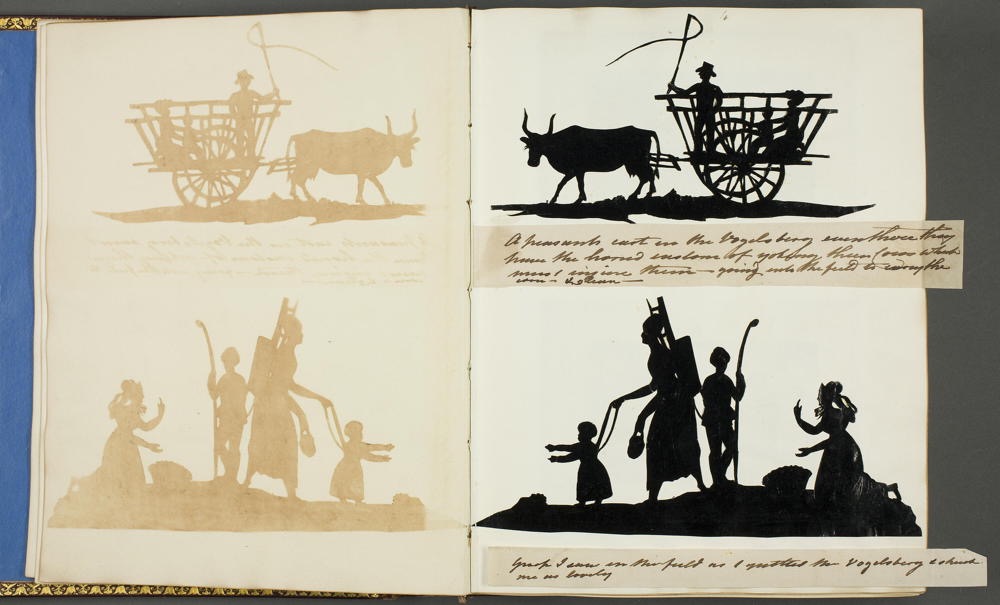
Various Unnamed European Artists (19th century),
compiled by Queen Adelaide of England:
Queen Adelaide’s Album (1823–1837)
" … something quite the opposite of an encyclopedic rendering."
The arc of history seems to trend toward the ever simpler. What starts as complexity resolves into simpler forms through extended iteration until it might almost seem routine. We eliminate apparent meaningless effort to focus activity toward producing results, dropping ceremony in favor of what we firmly believe to be ever greater efficiencies. Left to its own devices, genealogy would probably eventually smother itself with ever-greater detail, for every life has always been lived at one-inch-equals-one-inch scale, so every representation can be found to be wanting: another clever exposition, another sidebar comparison, another history lesson to better outline the then present context. The genealogist never rests. He's always looking for additional angles. Without care, any Fambly's history might mature to become precious, even self-conscious, when it probably should have remained in some much simpler forms.
Engineers use the term FeepingCreaturism to label this tendency for something to become ever more complex in development.
DeconstructingHistory
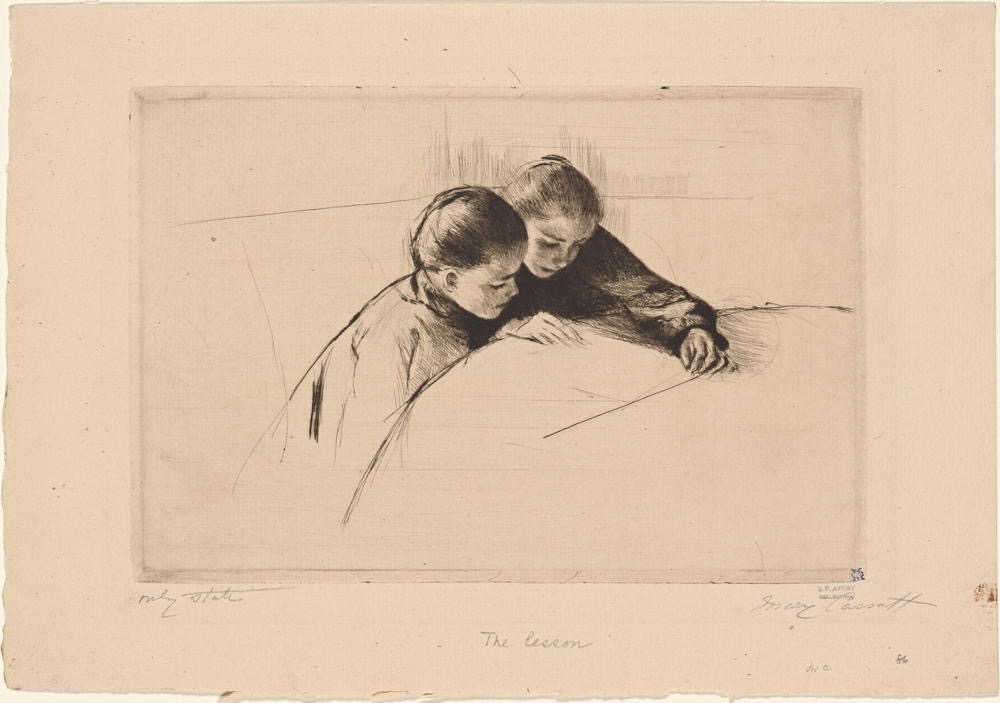
Mary Cassatt: The map (1889)
" … anybody interested in this Fambly's history will have to rediscover it for themselves …"
In the end, or nearing the end, I carry too many stories. Each seems especially important, even magical, for they represent discoveries. They were once lost, and now they're found, but in finding them, I overwhelmed my ability to retain them. What I initially complained about as clutter, I might have merely transformed into another form of clutter, open tabs rather than dog-eared loose-leaf notebooks, or open tabs and loose-leaf notebooks with fresh pieces of paper slipped in between the pages. I might have made the archive worse. This might represent the curse. We firmly believe that only we will make this world coherent before discovering that the best we mustered was a different form of the same old incoherent mess.
Maps hold some hope.
UnderConstruction
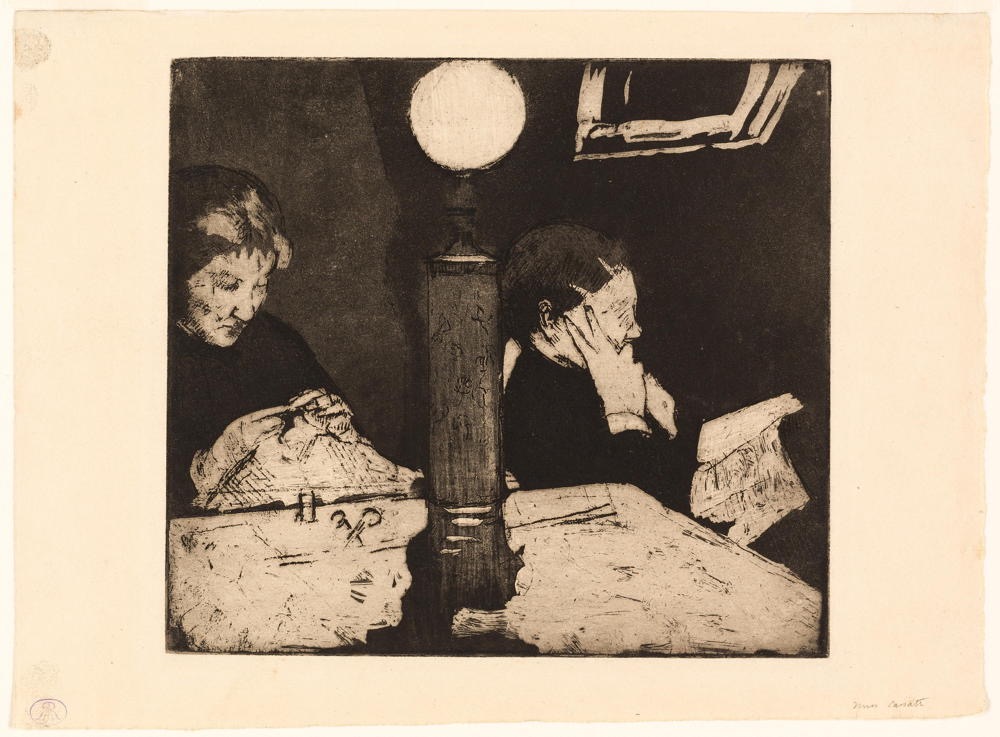
Mary Cassatt: Under the Lamp (c. 1882)
" … this series remains UnderConstruction and strenuously avoiding completion."
This series remains under construction. It might appear that I'm getting closer to finishing this series of stories with each installment, but each piece might be better considered preliminary. I've not yet decided where this series will end, for instance, so each fresh chapter probes in the hope of discovering where and how to finish it. Each story might stand on its own, but I intend that they be connected. I know my fifth-grade teacher also insisted that I should outline a work before beginning to avoid precisely this unsettling eventuality, except that I was never able to successfully know all I would have needed to know to outline anything before I started writing. The act of writing finds the way, not the other way around.
Consequently, I'm challenged to learn many things on the fly.
Visualizing
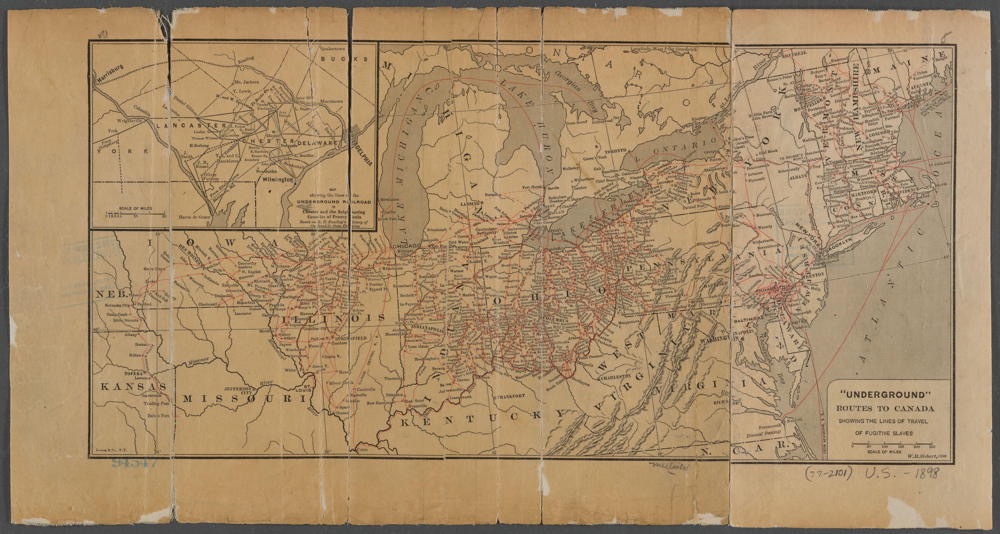
Wilbur Henry Siebert: "Underground" routes to Canada: showing the lines of travel of fugitive slaves (1898)
"Until then, I will be fueling renewed frustration."
"Trees" have become the traditional means for visually displaying a Fambly's history. They show the simple head-to-foot association of one generation to another as if each successive offspring stood on their parents' shoulders. These do not show geographical dispersion, but they aren't intended to. To display migratory paths, I must omit some information. Parent/child associations compete with physical locations to complicate any representation. Using layers, colors, and other graphic associations, I might produce a visualization too complicated for interpretation, so I must be extremely patient with myself.
One thread of my paternal grandmother's history involves the Bond into the Bounds line.
Transpositioning
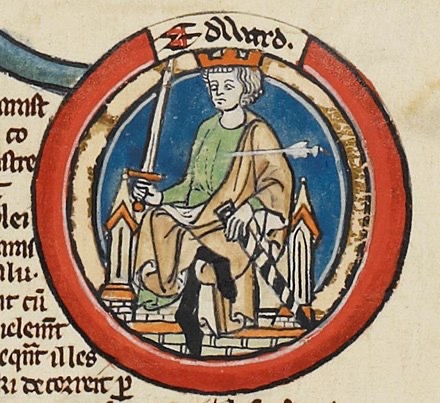
Miniature of Edward the Martyr
in a royal genealogy of the 14th century.
" … the terribly fortunate ones, the benefactors of almost endless Transpositioning."
A Fambly history might best be recognized as a permanent record of that Fambly's Transpositioning, for given broad enough horizons, it will encompass pretty much every possible human condition. Royalty will counterbalance laity, saints stand alongside sinners, and heroes hang with cowards. Deciding what the Fambly story means might well prove daunting, even impossible, because it might and could mean anything, everything, and nothing definitive at all. That history might not intend to mean very much of anything, anyway, but to demonstrate how everything tends to reduce to nothing and nothing to somehow represent anything at all. When I can see through the personalities and dates and shift my focus toward perceiving what none of the stories explicitly states, I might approach a better and higher purpose for telling those stories.
As I concluded a few episodes ago, history represents the most substantial possible evidence that we were each born equal.
THE

Ethelred the Unready, circa 968-1016. Illuminated manuscript,
The Chronicle of Abindon, c.1220.
MS Cott. Claude B.VI folio 87, verso, The British Library.
Scanned from the book The National Portrait Gallery History of the Kings and Queens of England by David Williamson, ISBN 1855142287., Public Domain, https://commons.wikimedia.org/w/index.php?curid=6639643
"I can't quite wrap my arms around the title Emperor THE Chuck."
Among the many, many distractions those of us with royal distinctions in our family history must contend, the presence of singularities ranks as one of the highest. It's one thing to have an Uncle Bob and quite another to possess an Uncle THE Bob. I've found innumerable instances throughout the records of someone like my long-lost something great-grandfather Ethelred THE Unready. Who could ask for a sorrier moniker? Ethelred was, predictably, a son of King Edgar THE Peaceful and survived the assassination of his older half-brother, King Edward THE Martyr, to take the English throne at twelve, thereby the unready designation. The unready designation was a play on words. "His epithet comes from the Old English word unræd meaning "poorly advised"; it is a pun on his name, which means "well advised" [Wikipedia]
He lived a suitably noteworthy life, as any half-decent monarch might, though the Danes deposed him after a particularly egregious and unnecessary attempt to slaughter every Dane in England.
Weekly Writing Summary For The Week Ending 5/09/2024
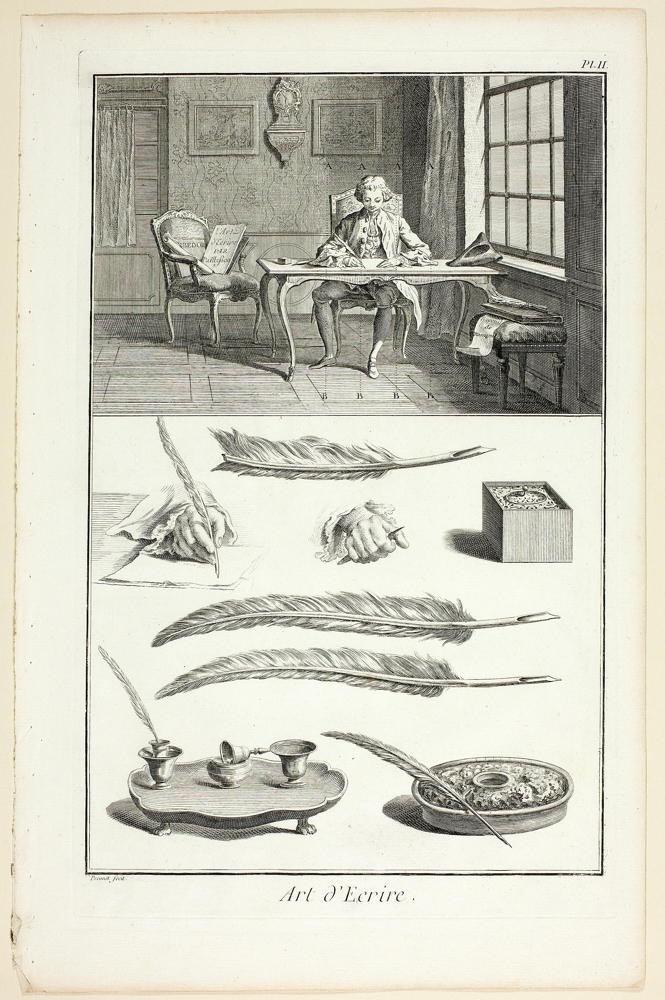
Benoît-Louis Prévost: Art of Writing, from Encyclopédie (1760)
Stand For Their Ambiguous Selves
I find it fascinating how failing to figure out what this life’s all about might prove to be what this life’s all about. Any notion that any of us might reach any authoritative conclusion seems lame in actual execution. Our questions might best exist unanswered, their purpose never actually being resolution but a representation of the inherent unanswerability of many of our questions. Go ahead and open up your Fambly history to public scrutiny. No amount of second-guessing will very likely resolve very much of anything. The significant questions might properly remain unanswerable. We rile. We stir the soup not to improve the flavor but to keep some of it from sticking and scorching on the bottom of the vessel. After all of this effort to tell these stories, I’m left believing that these stories probably always stood up for themselves. I’m no judge. I’m no master reinterpreter. I must have no idea what any of these stories ever meant. They have to stand up for themselves, indifferent to whatever you or I conclude. My purpose might have never been to conclude for my forebears. They might get to stand for their ultimately ambiguous selves. Just like us.
Fulk II of Anjou

Coat of arms of Hercule (François) of Valois, Duke of Anjou
By Carlodangio - Own work, CC BY-SA 4.0,
https://commons.wikimedia.org/w/index.php?curid=61574700
"I'm a dabbler …"
Though my heritage identifies me as a direct descendant of the kings of France, Spain, England, Italy, and what would one day become Germany, I do not feel very much like royal material. This condition might speak back to my high school years when my guidance counselor declared me not college material, a welcomed designation at the time, for it freed me up from concern about getting good grades or paying for college. I considered the declaration a Get Out Of Jail Free card in my early real-life Monopoly playing. Likewise, I can't see myself concerning myself with all the relationships necessary to maintain a halfway decent duchy, let alone a full-blown kingdom. It doesn't surprise me that royalty fought each other so continually and aggressively, for each seemed to be playing extended games of Suicide Chess, an unimaginably complex undertaking sure only to leave every player paranoid.
One of my lesser forebears, a full-blown Duke of Anjou, Fulk II, The Good, was known for his skill at negotiating strategic marriages.
Names

By Graoully - Self-photographed, CC BY-SA 3.0,
https://commons.wikimedia.org/w/index.php?curid=2770007
Vitrail représentant saint Arnould, chapelle Sainte-Glossinde
Stained glass representing Saint Arnould, Sainte-Glossinde chapel
(One of my 43rd Great-grandfathers)
"I could have been named after another forebear …"
I am blessed with a surname that sounds like a punchline from a Marx Brothers movie to most people. I believe that many immediately discount me due to my name's inherent joke quality. I admit to even discounting myself sometimes in the past. Why, oh why, couldn't I have been blessed with an innocuous name instead? Something even people with a lisp could comfortably pronounce? Something with more than one meager vowel?
Well, as sorry as my surname might seem, my super secret middle name seems exponentially more humiliating.
ClarissimaFemina
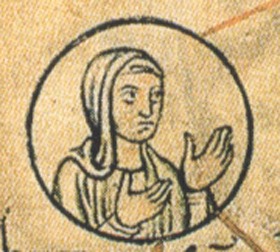
Detail from the Chronica sancti Pantaleonis:
Hedwig of Saxony - One of my 31st Great-Grandmothers
(12th century)
" … and sometimes even saints."
I have been delighted to discover that many of my Great-Grandmothers were famous or notorious enough to warrant getting their picture taken during their time. Before cameras, sketches were photos, and so were pottery, paintings, and sundry engravings. Almost every female in my Fambly tree between 500AD and the fifteenth century left some graven image ranging from pottery chard to Eleanor Crosses. None of these images were very likely true to their subject. I suspect that most were idealized and iconic, likely attempting to represent a most prominent attribute, be that an unusually large nose or blond hair, such that anyone who'd heard their legend might readily feel as though they recognize the image. Yes, most of these women also have some legend attached to them.
I think it is tragic that history continues primarily from a patrilineal perspective.
ANewCatechism
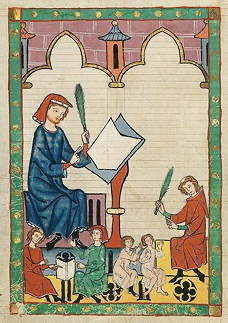
Master of the Codex Manesse:
Codex Manesse, fol. 292v,
"The Schoolmaster of Esslingen"
Der Schulmeister von Eßlingen)
(between 1305 and 1340)
" … reliably vanquishing dragons since before St. George."
How has the study and exposition of my Fambly's history changed me? It's probably too early in the transformation process to meaningfully begin to describe how I might have changed. I'll admit to feeling as though I'm changing without suggesting that I might know just how I will eventually be changed. I carry a strong sense of before and of since, of my understanding of my world having significantly shifted as a result of my recent discoveries. I plan to continue my studies to delve deeper into the histories that had previously escaped relevance. Suddenly, I'm curious about the late Middle Ages now that I have names, dates, and even some detailed personality sketches with which to personally relate. History's no longer just dates but personal causes and effects, real consequences, a present source of vanity, pride, and perhaps even more profound understanding. I seem to have acquired a greater stake in relating to the past.
I imagine future generations teaching their children this essential context, such that they might be able, as I have noticed myself suddenly able, to name my forebears in reverse sequence.
Bob

Grain Elevator, Condon, Oregon
" … the gods of geneology will decide."
It's probably always been the case that none of us really control our fate. With my family's history all spread out, I can see what eventually came about. I cannot imagine very many outcomes resulting from consciously deliberate choice. Sure, we each make decisions, mostly modest and a few monumental, but none seem to reasonably sum to produce any fate. Insignificant increments might conspire to finally sum up to something that might have been aspired to but couldn't really have been. Historians might ascribe to some specific decision whatever outcome ultimately resulted, but this world works more insidiously than that. Contrary to popular mythology, not one of us was ever really self-made. We were probably more crafted by ten thousand hands, most of which never imagined they were leaving a fingerprint or any sort of mark. We might manifest by less obvious means, and we likely create our explanatory stories to satisfy something other than reality. In reality, stuff happens, and however we come to pass rightfully remains mysterious.
That said, my father, Robert Clancy Schmaltz, an unwitting thirty-sixth great-grandson of Charlemagne, decided to move to Condon, Oregon, to help his dad.
Condon
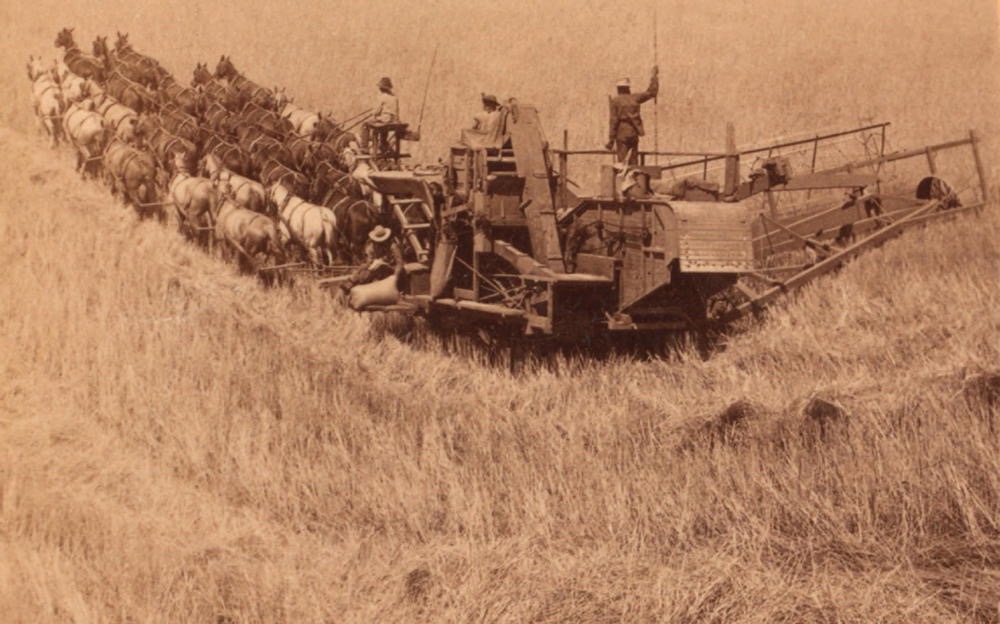
Evolution of sickle and flail, 33-horse team harvester,
cutting, threshing, and sacking wheat, Walla Walla, Washington. (1902)
Stephen A. Schwarzman Building / Photography Collection,
Miriam and Ira D. Wallach Division of Art, Prints and Photographs,
New York Public Library
"I visit her every Memorial Day."
The Gods decided, as The Gods always decide such things, in mysterious ways. After my mother's grandparents met as neighbors and then as step-siblings after each lost a parent and their surviving parent married their neighbor, they married and settled down on what appears to have been the neighboring ranches south of Condon, Oregon. They came of age in dryland wheat country, so they raised dry-land wheat, an incredibly labor-intensive effort. During harvest, scores of seasonal workers arrived to frantically work for a month or so before returning to from wherever they came or moving on to the next crop. Wheat harvest would melt into apple harvest, and the crews would disappear into the Yakima, Walla Walla, or Hood River Valleys to take advantage. In the days before the railroad came and before the co-ops built grain elevators, wheat was harvested into burlap bags, each holding three bushels and weighing about 180 pounds. The bags would fill on the harvester, and a worker would quickly whip-stitch them closed before slipping them off for later gathering.
My maternal grandfather, Elza (pronounced El-Zee) Franklin Wallace, worked this sort of wheat harvest, as did my grandmother, Ruby Kenaston, since she grew up on that ranch.
Weekly Writing Summary For The Week Ending 5/02/2024
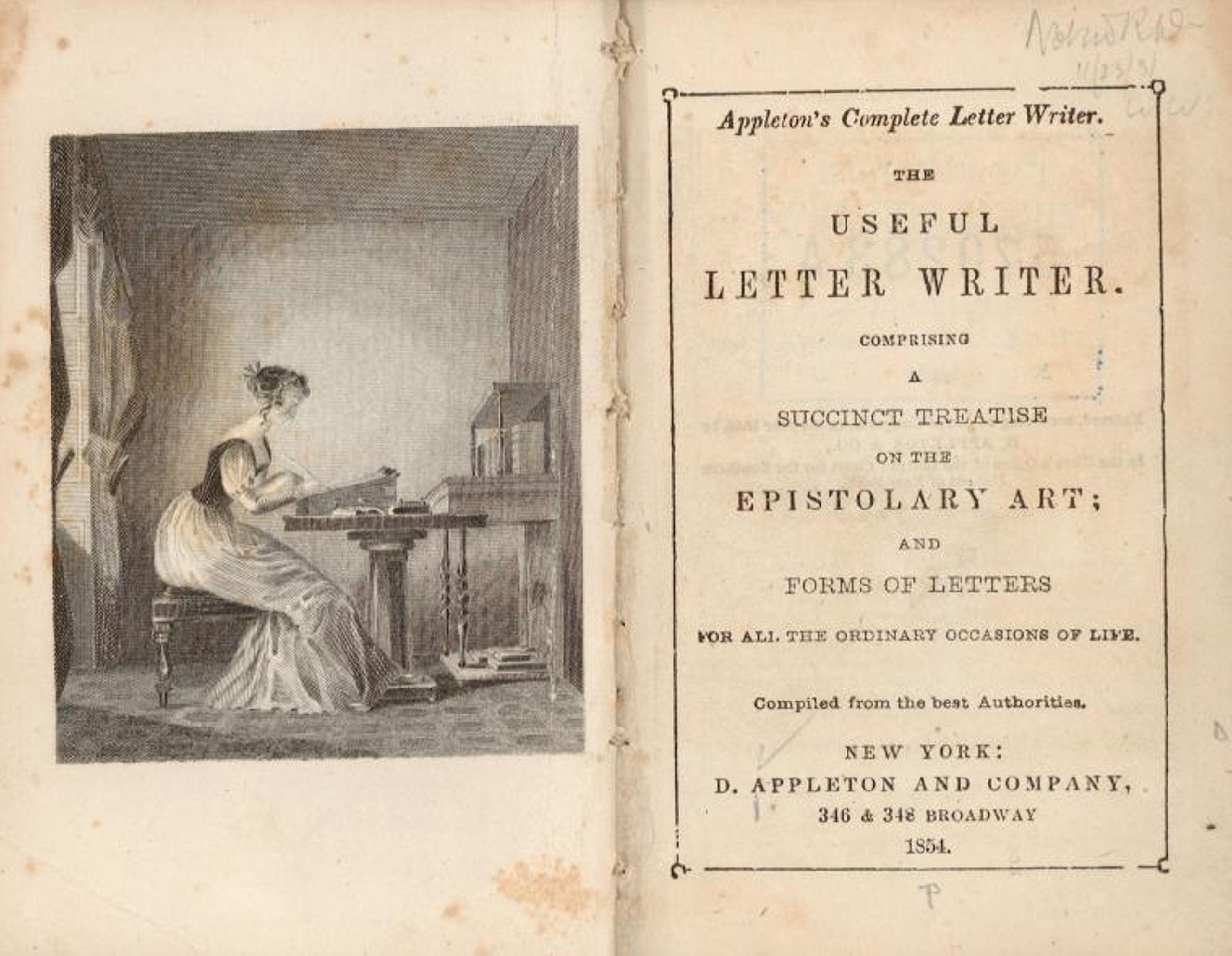
Appleton's complete letter writer..., [Frontispiece & title page] (1854)
With Nothing Remaining To Impart
I face a dilemma going further forward into these Fambly Stories. I’ve almost accomplished what I imagined I might have achieved when I started this effort, but I’ve only used half the time I’d allocated. Working a theme until the season ends has long been my practice. Into this twenty-eighth iteration, I’ve been faithful to this pattern. It has become a defining element of my work and has been unquestioned until now. I’m not quite finished, but I can see that it shouldn’t take too awfully many more stories to bring all the disparate threads together. My original vision will be satisfied once my parents meet and marry. Now, I’m wondering what I should include that I could not foresee before I found myself immersed in producing these stories. What might have been the deeper hidden purpose behind this whole exercise? How have these stories informed my perspective? What have I learned, and what have I lost? I guess I will continue writing this series until its popsicle stops giving flavor and turns into a clear icicle with nothing remaining to impart.
AGreatDepression
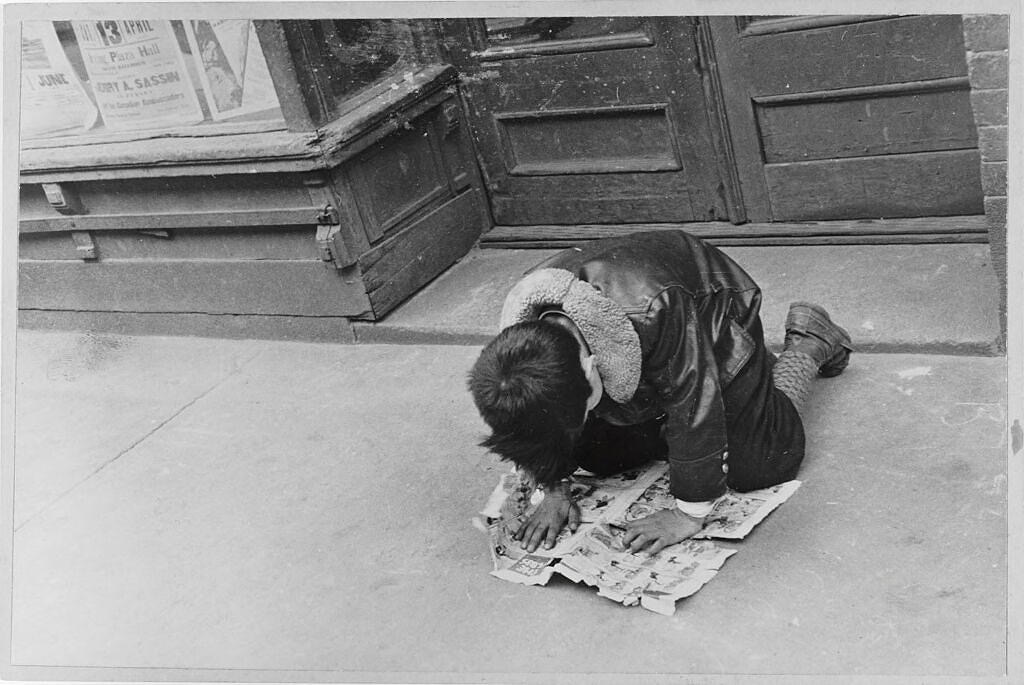
Ben Shahn: Untitled [Greenwich Village, New York City] (1935)
" … the reason I had a chance to be alive."
My father's brother Dan was born three and a half months after his parents were married in 1921. They were married far away enough from Mt. Angel to ensure that none of the locals would witness the scandal, his mom having recently been the local pharmacist's wife. They lived that first year or more in St. Helens, a town sufficiently distant that nobody who knew anything would likely bump into them. They returned with, as I mentioned earlier, a remarkably mature infant. My father, Robert Clancy Schmaltz, arrived shortly after that. The couple settled into a tiny house—"a cottage small near a waterfall"—in nearby Scotts Mills, a few miles out of Mt. Angel, but distant enough to avoid daily scandal. My grandfather Nick assumed responsibility for Schmaltz & Sons’ deliveries on that side of the county. The kids, Dan and Bob, settled into school and small-town life. Their parents divorced sometime after 1930. Their mom, Cassie, had been carrying on with Ed, a mechanic whose shop was just down the alley from their place. This separation injected fresh chaos into everyone's lives.
My dad and Dan began spending more time with their grandparents, even attending the Catholic school near their place.
MtAngel
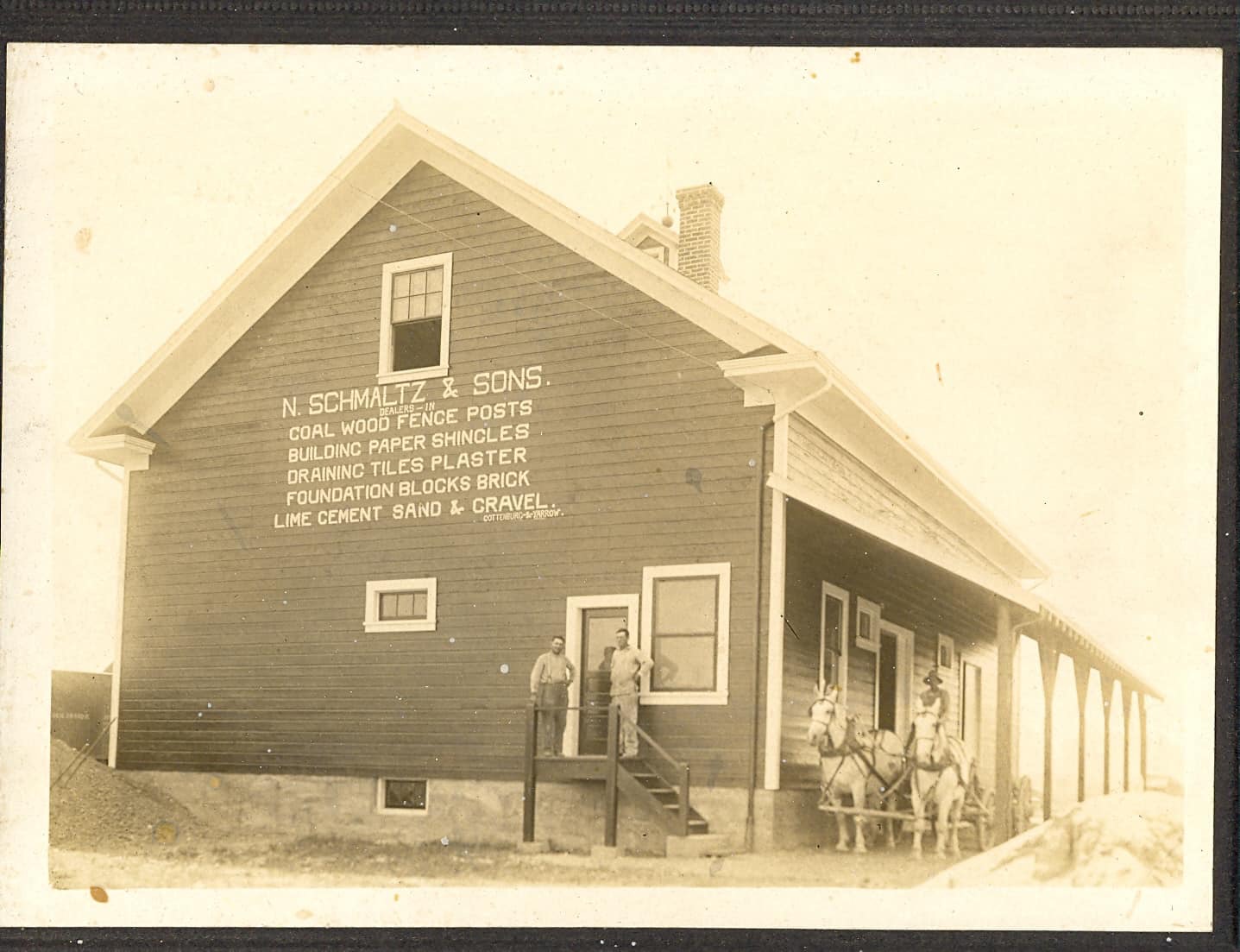
Schmaltz & Sons Warehouse, Mt Angel, Oregon (circa 1910-15)
Mt Angel Historical Society
"There's only a plaque there now …"
Nick and Elizabeth Schmaltz had relocated from Devil's Lake, North Dakota, to Mt. Angel, Oregon, by August of 1909 when their youngest daughter, Lucy, was born. Fifteen years after emigrating from Ukraine, Nick had arrived in his Eden at the End of the Oregon Trail, a small city tucked into the northern edge of Marion County, Oregon. We no longer have cities like Mt. Angel in pre-WWI Oregon. Today, we classify Mt. Angel as a small town with few services. Then, it featured every service any city required. One could hop on a train connecting you to Salem or Portland. It featured a hotel with a ballroom. A pharmacy. A hardware store and, most prominently, Nick Schmaltz & Sons farm supply.
Further, Nick built a fine two-story home, the finest in town, across the square from the church. He served as a board member overseeing construction while no doubt supplying building materials properly discounted for ecclesiastical purposes.


